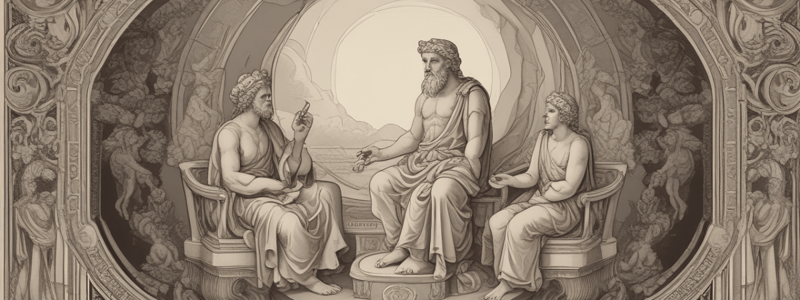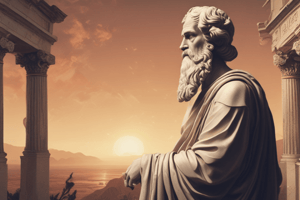Podcast
Questions and Answers
According to Plato, what is the ultimate reality?
According to Plato, what is the ultimate reality?
Why does Plato view art as useless?
Why does Plato view art as useless?
What is the primary issue with poetry, according to Plato?
What is the primary issue with poetry, according to Plato?
Why does Plato think poetry fails in the test of reason?
Why does Plato think poetry fails in the test of reason?
Signup and view all the answers
How does Plato think poetry affects humans?
How does Plato think poetry affects humans?
Signup and view all the answers
What is the main criticism of drama, according to Plato?
What is the main criticism of drama, according to Plato?
Signup and view all the answers
Why does Plato think the audience loses their individuality while watching a play?
Why does Plato think the audience loses their individuality while watching a play?
Signup and view all the answers
What is Plato's view on the pleasure of tragedy and comedy?
What is Plato's view on the pleasure of tragedy and comedy?
Signup and view all the answers
Why does Plato think poetry and drama are non-moral in character?
Why does Plato think poetry and drama are non-moral in character?
Signup and view all the answers
What does Plato think is the most important aspect of a play?
What does Plato think is the most important aspect of a play?
Signup and view all the answers
What is the central concept in Plato's Theory of Ideas?
What is the central concept in Plato's Theory of Ideas?
Signup and view all the answers
Why does Plato believe poetry is deceptive and potentially dangerous?
Why does Plato believe poetry is deceptive and potentially dangerous?
Signup and view all the answers
What is Plato's main criticism of poetry's origin?
What is Plato's main criticism of poetry's origin?
Signup and view all the answers
How does Plato believe poetry affects humans?
How does Plato believe poetry affects humans?
Signup and view all the answers
Why does Plato think drama is different from poetry?
Why does Plato think drama is different from poetry?
Signup and view all the answers
What does Plato think is wrong with the characters in plays?
What does Plato think is wrong with the characters in plays?
Signup and view all the answers
Why does Plato object to the pleasure of tragedy and comedy?
Why does Plato object to the pleasure of tragedy and comedy?
Signup and view all the answers
What does Plato believe is the role of a play?
What does Plato believe is the role of a play?
Signup and view all the answers
Why does Plato think art is useless?
Why does Plato think art is useless?
Signup and view all the answers
What is Plato's core criticism of poetry and drama?
What is Plato's core criticism of poetry and drama?
Signup and view all the answers
Study Notes
Plato's Critical Views on Art and Poetry
- Plato's views on art and poetry are closely tied to his Theory of Ideas, which posits that ideas are the ultimate reality.
- According to Plato, things are conceived as ideas before they take practical shape as things.
Criticism of Art
- Plato views art as useless, as it adds neither knowledge nor intellectual value.
- Art is seen as deceptive and potentially dangerous, sometimes teaching immoral lessons.
Criticism of Poetry
- Poetry is considered twice removed from reality, making men believe in imperfection.
- Poets are inspired suddenly, which cannot be truthful, and poetry fails the test of reason.
- Poetry affects emotions, not reason, and appeals to the heart, not the intellect.
- Emotions are temporary and cannot be safe guides to men.
- Poetry is non-moral in character, treating both virtue and vice alike, and corrupting human beings.
Criticism of Drama
- Drama is a branch of poetry, and its approval and disapproval depend on the audience.
- Dramatists use cheap techniques like quarrels, lamentations, thunder, and sounds of animals to convince the audience, which are shameful in normal life.
- Audience members who watch characters who are cowards, knaves, and criminals tend to become one such character, losing their individuality.
- Such characters should not be present in a play; a play should have good characters.
- Plato is against the pleasure that tragedy and comedy give, as they exploit human emotions like anger, fear, and grief for pleasure.
- In comedy, people laugh at cowardly or criminal characters, who should be pitied, not laughed at.
Plato's Critical Views on Art and Poetry
- Plato's views on art and poetry are closely tied to his Theory of Ideas, which posits that ideas are the ultimate reality.
- According to Plato, things are conceived as ideas before they take practical shape as things.
Criticism of Art
- Plato views art as useless, as it adds neither knowledge nor intellectual value.
- Art is seen as deceptive and potentially dangerous, sometimes teaching immoral lessons.
Criticism of Poetry
- Poetry is considered twice removed from reality, making men believe in imperfection.
- Poets are inspired suddenly, which cannot be truthful, and poetry fails the test of reason.
- Poetry affects emotions, not reason, and appeals to the heart, not the intellect.
- Emotions are temporary and cannot be safe guides to men.
- Poetry is non-moral in character, treating both virtue and vice alike, and corrupting human beings.
Criticism of Drama
- Drama is a branch of poetry, and its approval and disapproval depend on the audience.
- Dramatists use cheap techniques like quarrels, lamentations, thunder, and sounds of animals to convince the audience, which are shameful in normal life.
- Audience members who watch characters who are cowards, knaves, and criminals tend to become one such character, losing their individuality.
- Such characters should not be present in a play; a play should have good characters.
- Plato is against the pleasure that tragedy and comedy give, as they exploit human emotions like anger, fear, and grief for pleasure.
- In comedy, people laugh at cowardly or criminal characters, who should be pitied, not laughed at.
Studying That Suits You
Use AI to generate personalized quizzes and flashcards to suit your learning preferences.
Description
Explore Plato's critical views on art and society, as discussed in his Theory of Ideas in The Republic, where he sees art as useless and deceptive.




